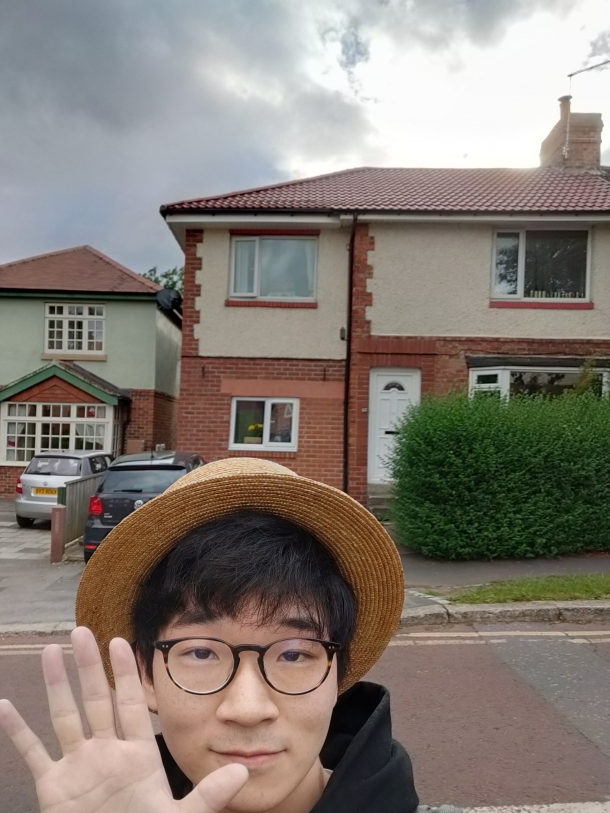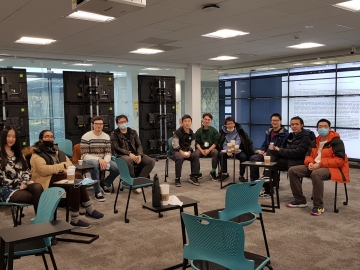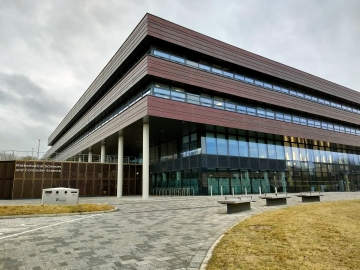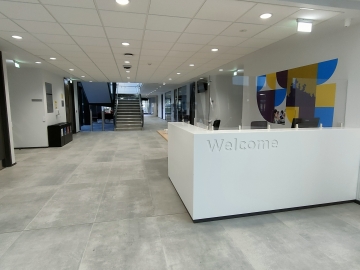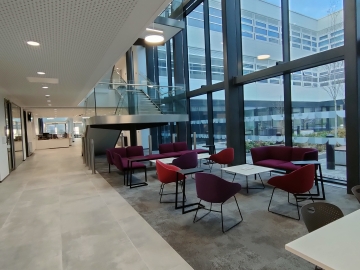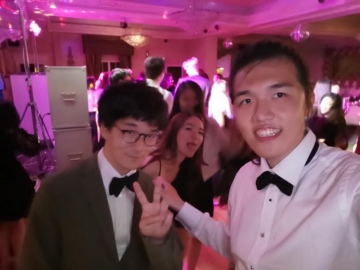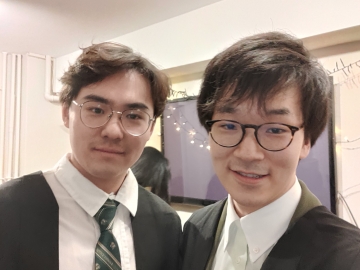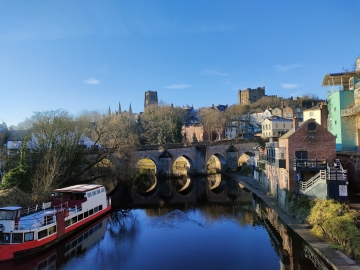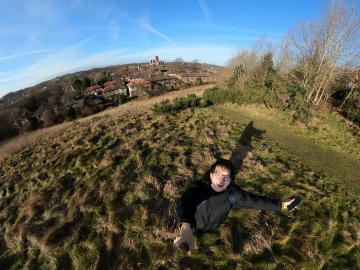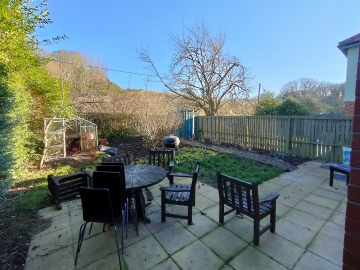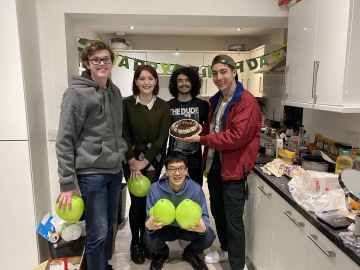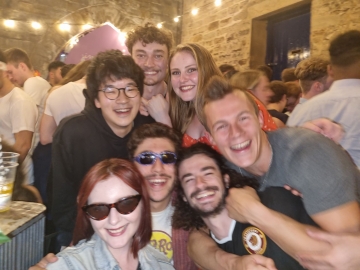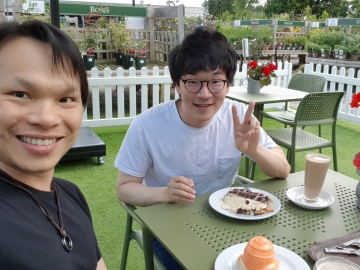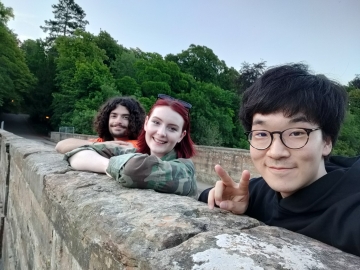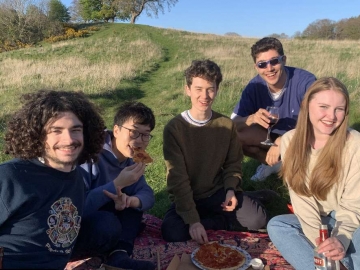- Study abroad
- Yoshiki KUBOTANI
Yoshiki KUBOTANI

- Posted
- Fri, 31 Mar 2023
Yoshiki Kubotani | 2nd year master’s student, School of Advanced Science and Engineering
- Visiting period: January to July 2022
- Visiting university: Durham University
- Visiting country and region: Durham, UK
Below is a study abroad experience report from Yoshiki Kubotani (2nd year master’s student, School of Advanced Science and Engineering), who was able to go to Durham, UK, to study at Durham University. This study abroad experience was possible due to support from Waseda University’s Top Global University project “Waseda Goes Global”, referred to as TGU below.
Introduction
With the support of the SGU project, I went to Durham University in the UK to study abroad for about 6 months, from mid-January to early July. This was the first time I had stayed abroad for more than a month, so there were many hardships. But more than that, I had a lot of fun and learned a lot of new things, and I think this study abroad was an unforgettable and precious experience in my life.
I have prepared this report to share what I saw, heard, and learned during my experience, from the preparation stage to my return home. It is a bit long, but I hope you will enjoy reading it.
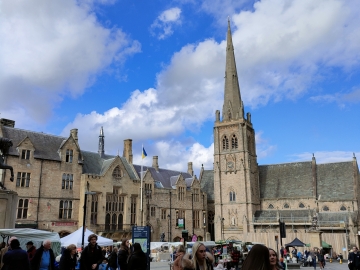
The central square in Durham city
My Decision to Study Abroad and Funding Support from TGU
It was around July 2021 that I made a clear decision that I wanted to study abroad. I was in my first year of graduate school then and had just reached the end of my undergraduate research. I had always had a strong aspiration to study overseas. I wanted to experience life in other countries at least once while a student, but I had been holding back for a long time, citing my lack of English ability and time as excuses. I was also on the fence at that time about whether or not to go on to a doctoral program.
Considering all these things, I finally made up my mind to study overseas, telling myself, “I can surely broaden my horizons through research overseas, and this could be the last chance to study abroad even if I stop my academic career with a master’s.” When I conveyed these thoughts to my supervisor, he respected my decision. He also gave me a list of several potential destinations and a brief explanation of the costs, duration, and other details. I cannot thank him enough for his support. After I got my supervisor’s permission and decided to go to Durham University, there was the problem of the cost. My supervisor gave me information about the Waseda Goes Global project in which Waseda University had received funding from the Japanese government as a designated Super Global University (SGU). It includes grants for students who want to study overseas, and I could receive financial support for my stay.
Preparation for Study Abroad
Preparation for study abroad involves a wide range of activities, such as applying to the university or laboratory, obtaining English scores (if English is not your first language), deciding where to stay, and preparing the necessary documents for departure and entry into the country. It is normal to start the above preparations about one year before your departure. My case was, however, quite unusual in that I started them in August, even though I was scheduled to begin studying abroad in January 2022. In addition, due to Covid-19, Waseda University was cautious about sending students abroad, so getting permission from the university was itself a challenge at the time. That made it even more difficult to negotiate with the university and laboratory that I was going to, as well as the landlord of my accommodation, because I had to take into account the possibility that I might not be allowed to go overseas. It was a blessing in disguise that I did not have to apply for the UK visa, which was supposed to be the most time-consuming step, as the UK government allowed Japanese nationals to stay for up to six months without a visa.
I am not sure about the general university system in the UK, but at Durham University, students who stay for a short period for research purposes are called “visiting research students” and are treated in the same way as regular postgraduate students, meaning they have to go through the same screening process for doctoral course enrollment. The process took several months, so I had to present my English proficiency score by the beginning of November at the latest. I still remember making an appointment for the IELTS test in a hurry. Fortunately, since I had been studying English continuously for some time, I managed to get the minimum score required for enrollment despite the sudden exam. Just for your information, TOEIC scores are not so helpful for studying abroad, so if you are considering studying abroad, I recommend that you check the list of valid English tests in the application guidelines of your target university beforehand.
As for my accommodation, it seemed that there were two main housing options in Durham; the university dormitory or a private share house. I chose private accommodation, sharing with local students, to improve my English skills by putting myself in an English-only situation. Also, I genuinely wanted to experience a lifestyle where students shared the same house and cooperated with each other, which was utterly new to me. Honestly, this choice was a perfect decision. I could make many precious friends and a lot of unforgettable experiences, which I will describe more in detail below.
Life in the UK
Eventually, I received permission from the university and could land safely in the UK in early January. After a week of self-isolation at the hotel, I moved to my accommodation, and my 6-month study abroad adventure began. From here, I would like to write about my experience in the UK from two aspects: research and daily life.
My Research at Durham University
The members of my laboratory at Durham University were all PhD students, and many of them were international students from China. They were all so kind that they explained the laboratory system and some initial necessary procedures to me, which I did not know anything about at first and was at a loss. At Durham University, unlike in Waseda, each laboratory only has a professor’s private office, and all PhD students work in the same workroom, being assigned a desk. This meant that we could communicate with a wide variety of students regardless of the framework of their laboratories. I often went for dinner with them after work and was once invited to their home and treated to delicious homemade Chinese food. I also had several opportunities to talk alone with the laboratory professor, and he kindly bought me coffee or cake each time.
As I noted above, my research study abroad program started with these wonderful members. Next, I would like to move on to what kind of research theme I was actually working on and how I settled with that theme.
In most research programs, you apply to a laboratory based on your strong field to develop your research in collaboration with professors and other research students. In my case, however, I did not have a specific theme in mind for the program because my purpose was to broaden my knowledge of computer science. Therefore, for the first half month or so of my research in Durham, I spent most of my time reading papers given by my professor and reporting on their contents with my analysis at weekly meetings.
After a few weeks, I participated in a project that a PhD student had already been working on. In this project, we tried to build a model that could accurately recognize time-varying human behaviour in videos. Conventional models only use the image information from the video as input, resulting in low quality when sufficient image information is unavailable due to occlusion or other reasons. To alleviate this problem, our research aimed to construct a more robust model against occlusion by extracting the key points of humans and objects in the video to use their geometric information as a reference.
The project itself started several months before I came to the UK, and they had already had some results. However, setting the paper submission to a world-class conference as a goal, they needed more resources, and I was asked to join the project as a co-researcher. Even though its deadline was early March, other tasks remained besides writing the paper. So, I mainly helped them collect data and write code for additional experiments. That was the first time I tackled a full-fledged collaborative research project, working with close communication and helping each other out. I enjoyed it much more than I had imagined because sharing the workload kept the absolute amount of work per person under control. Besides, the fact of not working alone was great for mental support. In particular, I remember renting a room at the university to create a data set and shooting videos with the lab members. It was a good memory of getting to know them better.
The main project mentioned above was driven forward through discussions with the other researchers via e-mail and weekly meetings. Apart from this, there was a weekly seminar where doctoral students took turns introducing the latest papers, which helped me gain knowledge in various fields. I presented two times on recent object detection research, too. Through the preparation, I gained a deeper understanding of the field and acquired some English presentation skills.
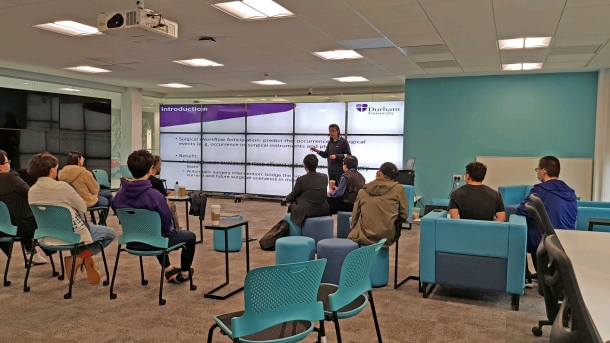
Weekly seminar run by doctoral students.
Just before the submission, we spent a few intense weeks busily coding, running experiments, and creating figures for the paper with meetings every few days. Due to these efforts, our project was finally accepted by one of the top conferences in computer vision called ECCV, finishing my study abroad experience with personally satisfying results. All these experiences were very valuable to me, as I learned firsthand the effort required to submit a paper to a highly competitive academic conference and the difficulty of managing a schedule with aiming it.
Life in Durham
Durham is a small town in northern England, located about three hours by train from London. It is home to Durham Cathedral, which is registered as a World Heritage Site and is famous for being used as a location for the Harry Potter films. Although the population is not very large, the city is pretty lively because there are many Durham University students. There is also a lot of nature in town, with many birds, squirrels, foxes, rabbits, and other animals in the surrounding forests, plains, and hills.
From here, I would like to share some aspects of my daily life in this beautiful town of Durham. First, regarding housing, which is the foundation of my life, as mentioned above, I lived in a shared house. We shared a flat with 9 share mates including myself, all of whom were students or graduates of Durham University. They were all younger than me, ages varying from 18 to 21. But, when I told them that I was 24 years old, they were all surprised and said, “I thought we were around the same age”. (Indeed, I was asked to confirm my age every time I bought an energy drink at the supermarket… in the UK, the purchase of energy drinks for those under 16 was prohibited from 2019.) Perhaps it is because many Asian people do not let their beards grow, it gives the impression of being young?
It seemed rare for my share mates to share the house with students like myself, who are not graduates of Durham University or regular long-term students. Their unfamiliar feeling is related to the unique college system of Durham University. At Durham University, college is a component of the university. Still, it does not have an educational function; it only functions as a mechanism to promote student interaction and accommodation. As a result, each college holds unique characteristics and culture, and students have a strong sense of belonging to a college rather than a university. Hence, each college often has different teams in the same sport, for example.
Anyways, most students belong to one of these colleges when they enter the university and spend their first year in the dormitory, allowing them to deepen their friendships with mates. Therefore, when students move out of the dormitories the following year, they tend to share a house with friends from the same college. Of course, they look for new tenants when a room becomes vacant, but I have not heard of the case of research course students who are not fully proficient in English living with young native English-speaking students other than myself. So at first, I was worried about whether I could communicate well with them. Fortunately, they were very kind and did their best to understand my poor English, so I could get along with them immediately.
To extend the topic to life in a share house, I often watched movies and dramas on Netflix with my share mates. I was not the type of movie lover before coming to the UK, but I enjoyed a variety of films as they recommended, such as action movies, horror movies, comedies and so on. Indeed, Japanese anime was well-known abroad and widely known from major to minor shows. Thus, I sometimes watched Japanese anime instead of movies and dramas. I also found time between research projects to enjoy cooking, hanging out on the nearby beach, visiting a volleyball club, and so on.
Finally, for meals, I basically had two choices: cooking at home by myself, or eating out/using a food delivery service. I was not a very good cook, so when I did it myself, it was basically all pasta. When I ate out, I had no trouble choosing meals because there were various restaurants, including Chinese, Italian, fast food, etc. As all the payments in the UK can be made by card, only three times did I use the actual money during my six-month stay. This made me lazy to bring out my wallet, taking some time to break that habit after returning to Japan. Of course, I often ate some British food as well, like the most famous fish and chips and traditional pancakes called crumpets.
Future Goals after my Time Abroad
My six-month study abroad experience inspired me so much and changed how I think about my future. Before studying abroad, I had the impression that living or working abroad was a privilege for those who could speak English perfectly, such as returnees. However, after actually living with native speakers for half a year, I realized that even a Japanese person, who’s native language is not English, can live abroad depending on their own efforts.
I will graduate with a master’s degree and start working next April. Even after that, I want to be actively involved in overseas business. As for my job-hunting activities, it did not take a lot of time. I started after I went to the UK with all the interviews done online. As I did not want to have my priorities wrong, I narrowed down my choices to SONY only and prepared myself to go on to a doctoral program if I failed. In the end, I received an offer from SONY and will start working as an engineer in Japan next spring. In the future, I am eager to pursue a better career exerting my English ability and specialization. At the same time, I am strongly willing to work overseas if I have a chance. I believe that all of my confidence in my future plans can be attributed to my experience abroad.
